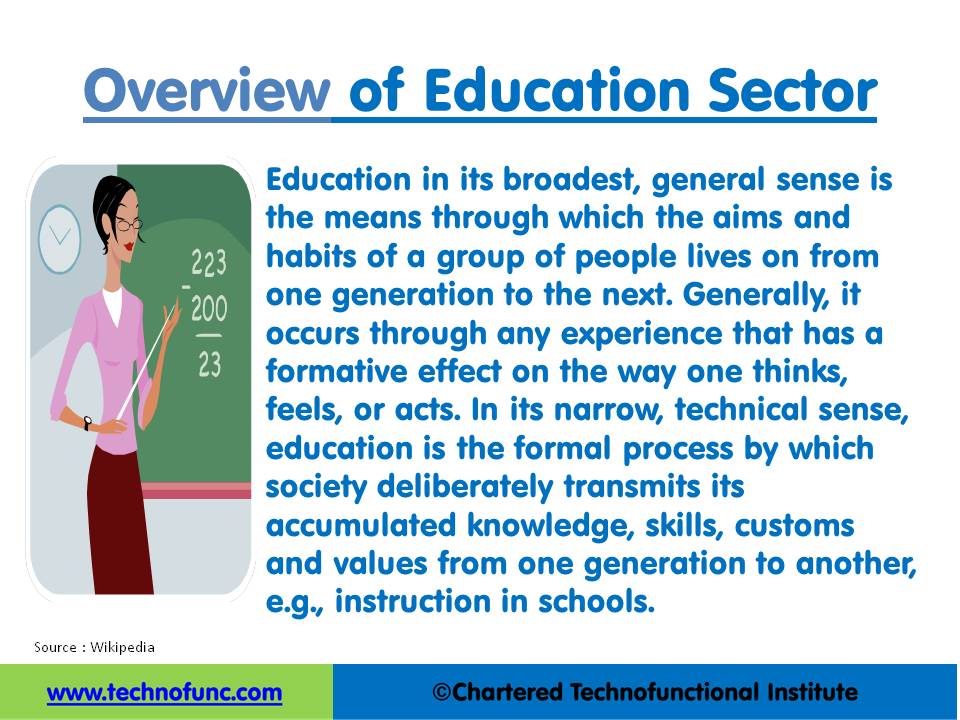- Home
- Business Processes
- Industry Knowledge
- Aerospace Industry
- Automotive Industry
- Banking Domain
- BFSI Industry
- Consumer/ FMCG Industry
- Chemicals Industry
- Engineering & Construction
- Energy Industry
- Education Domain
- Finance Domain
- Hospitality Domain
- Healthcare Industry
- Insurance Domain
- Retail Industry
- Travel and Tourism Domain
- Telecom Industry
- Leadership Skills
- eLearning
- Home
- Domain Knowledge
- Education Domain
- Overview of Education Sector
Overview of Education Sector
The education industry is expanding rapidly and its many businesses are eager for new talent, including experienced professionals and enthusiastic individuals just entering the workforce. The education industry can be described as the collection of organizations and businesses that provide products and services aimed at enhancing the quality of education in society. Read more to gain a complete overview of the education industry.
The education industry consists of schools, colleges, universities, and various private institutions. The education industry provides its students with the knowledge and skills to adapt to a continually changing working world. The industry consists of an expanding array of organizations that strive to provide lifelong learning to its customers. The education sector can be broadly classified as primary education, secondary education, higher education, and vocational education. The Education industry is crucial to the workforce capability of all other industries, but it also faces unique workforce development challenges of its own. With its responsibility for skilling the current workforce and preparing future generations for work and life, the Education industry is subject to intense public and political scrutiny and to frequent waves of policy change and review.
Organizations in the education sector include traditional colleges and universities as well as companies focused on training and development for clients that range from an individual learner to global corporations to online content delivery. As a whole, the industry is responsible for training individuals of all ages to learn new skills, obtain meaningful employment, and help accelerate the economic growth, by delivering education in traditional classroom settings or via online training over the Internet. The education industry also includes ancillary education services, such as after-school tutoring, charter schools, special or alternative education, educational content suppliers, and the professional development of administrators and teachers. This section contains articles that help learn more about this sector and understand its unique dynamics, opportunities, and challenges.
The education industry must adapt to the challenges of containing costs, differing views on standardized learning, competing for students, and adapting to changing economic needs. Industry players adopt unique strategies to overcome these challenges by forming education partnerships, adapting to new technologies, and developing customized and personalized learning programs. This section also discusses these challenges and provides a framework to adapt to these challenges.
The targeted audience for this section are consulting houses, teachers, students and learners, education industry investors, and all size companies that sell products or services to education players; organizations looking for knowledge and key business information in the education industry and players interested in content development for this sector.
“The equation is simple: education is the most basic insurance against poverty. Education represents an opportunity. At all ages, it empowers people with the knowledge, skills, and confidence they need to shape a better future.”
- Irina Bokova (Director-General, UNESCO).
Education in its broadest, general sense is the means through which the aims and habits of a group of people live on from one generation to the next. Generally, it occurs through any experience that has a formative effect on the way one thinks, feels, or acts. In its narrow, technical sense, education is the formal process by which society deliberately transmits its accumulated knowledge, skills, customs, and values from one generation to another, e.g., instruction in schools.
The Education Industry:
The education industry is expanding rapidly and its many businesses are eager for new talent, including experienced professionals and enthusiastic individuals just entering the workforce. The private sector is helping to transform education at all levels, from Pre-K to post-secondary. Only with a steady supply of new professionals will the pace of innovation remain strong. The education industry consists of schools, colleges, universities, and various private institutions. The education industry is booming across the world. The industry generates large scale revenues and employment. The revenues from higher education alone in the US are worth over $400 billion. There is a huge growth potential for this industry is fast-growing economies like India and China. The literacy rate in these countries is still below 60%.
The Education Division provides education services from preschool through to postgraduate courses and other education providers like music and driving schools but excludes childcare operators and student accommodation services. Consumers are the key users of educational services and choose between private and public providers. International students provide an export market for education services.
Education Industry Products:
- Government school education
- Private school education
- Preschool education
- University and other higher education
- Language and other education
- Technical and further education
Industry Activities:
- Preschool education
- School education
- Post-school education
- Other education
The Global Education Industry:
In terms of global size, the education industry is estimated to be valued in the trillions of dollars. The education industry plays a vital role in the global economy. Over 800 million adults in the developing world are illiterate and the majority live in the poorest countries. Education is the key to alleviating poverty in these nations – the more people who have access to education, the greater their chances are of leaving poverty behind. Knowledge, and the ability to educate citizens, is an important factor in a nation's worth. Countries with advanced education systems do better on the global market.
What is the Education Industry?
The education industry can be described as the collection of organizations and businesses that provide products and services aimed at enhancing the quality of education in society. The education industry plays an increasingly important role in supporting public education by meeting the demand for products and services that both complement basic education services and supplement their underlying goals. The industry is defined by four main categories: Schools/ Service Providers, Supplemental Education Service Providers, Products, and Education Service Businesses. Each category has distinct market segments, all of which are defined in the subsequent articles. India is one example of a country using globalization and higher education to improve the quality of life. The economy is thriving in areas where the software engineering industry has developed, and globalization offers many opportunities for educated people.

Role of Higher Education:
Today’s students will become the leaders of tomorrow’s education industry. Using a diverse skillset, ranging from business expertise to a deep understanding of education, visionaries have an opportunity to reshape the industry to better serve students of all ages. Higher education plays a vital role in accelerating the economic development of a country and making its citizens better skilled and more productive. Higher education makes it possible for people to learn how to create and use ideas and technologies to their advantage in a knowledge-based global economy. Individuals seeking a career in the education industry should be passionate advocates of change based on an understanding of the education market today. Higher education may result in higher income levels, greater tax revenues, increased entrepreneurial activities, and strong governance. Evidence suggests that higher education has a positive correlation with income level and quality of life for citizens in many countries.
Education Industry & Employment:
The education sector employs an enormous amount of graduates. It covers the three main areas of the school, further and higher education, as well as education that take place in non-school or college settings. The main area of work is teaching and lecturing, but there are other roles, particularly in education advice and development. Local authorities are the largest employers in this sector, but there are also a large number of independent schools, as well as colleges and universities. A teaching degree/formal education is a requirement for most jobs in this sector, but there are some opportunities to teach without this, for example teaching English as a foreign language.
Many companies in the education industry offer idealistic goals, combined with competitive salaries and generous benefits. Employment opportunities are as diverse as the companies themselves, ranging from consulting with school operators to working with software and textbook publishers. The industry is in a growth stage and is expected to be a major component of America’s 21st Century economy. Numerous new companies will join those currently in the industry to revolutionize the way people learn, research, collaborate, and teach.
Developing Nations – A Huge Market:
The two biggest economies India and China present huge opportunities for the Education Industry. Take the example of India alone where the education market constitutes of people with a median age of 25 years, has a target base of over 550 million people below the age of 25 years. This means that the number of people in India needing primary and secondary education alone exceeds the entire population of the USA. Since these students will be seeking higher education in India over the next decade it illustrates the sheer size of the Indian education market.
With the emergence of India as a knowledge-based economy, human capital has now become its major strength. This has put the spotlight on the severe inadequacies of India’s infrastructure for the delivery of education, particularly higher and vocational education. There exists a huge demand-supply gap and with its rapidly expanding middle class, India’s private expenditure on education is set to increase manifold.
Related Links
You May Also Like
-
Importance of Education Industry
Nelson Mandela has said, “Education is the most powerful weapon which you can use to change the world.” The following article touches on some aspects that highlight the importance of education industry for human society.
-
What drives the Education Industry
In the section, we will discuss the drivers of the education industry. Business drivers are influences, both internal and external, that significantly impact the direction of an industry. This will help the learner understand the internal and external factors that have a significant influence on the education industry.
-
Challenges in Education System
The Education sector underwent some major changes over the past five years. Enrolment in private schools outpaced government school enrolment for much of the period. Tutoring businesses and universities have offered new services to expand their market base. Online education is a major development for the Education Division, and technology is permeating all areas of education. Understand some of the major challenges that are faced by the education sector today.
-
The education industry is divided up into four sectors, which all have their own roles and functions. Each of the sectors caters to a growing demand for cutting-edge education products and services. Each category has distinct market segments, all of which are defined in this article below. For learners to understand the dynamics of the education industry, having a clear picture of the industry is crucial. This understanding will help in researching education companies, determining a career path, and even exploring potential employers.
-
History of Education & Its Growth as an Industry
Education in its general sense is a form of learning in which knowledge, skills, and habits of a group of people are transferred from one generation to the next through teaching, training, research, or simply through autodidacticism. This article takes you through the history of education and its development as an industry.
-
Different governments and different standards classify levels of education differently. There is a difference in nomenclature that is in practice today. However, for the purpose of simplicity, all classifications can be mapped to the grid provided in this article. Given below are commonly used different levels in the education process.
-
The education industry is expanding rapidly and its many businesses are eager for new talent, including experienced professionals and enthusiastic individuals just entering the workforce. The education industry can be described as the collection of organizations and businesses that provide products and services aimed at enhancing the quality of education in society. Read more to gain a complete overview of the education industry.
-
How to Improve Education System
The education industry today is faced with many challenges, and in order to improve the education system and the performance and development of the education industry, the major improvement must be made in the sector. This article discusses the major components that need to be worked upon to create an effective improvement strategy.
Explore Our Free Training Articles or
Sign Up to Start With Our eLearning Courses

About Us
Learning
© 2023 TechnoFunc, All Rights Reserved








